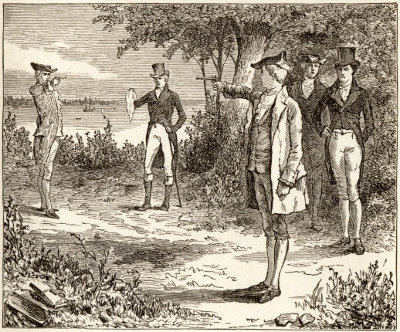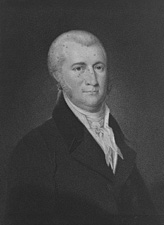| Home at Monticello during the spring of 1799"Jefferson
worried that Adams was going to raise a 'Presidential militia' the formation
of which would 'leave me without a doubt that force on the Constitution was
intended.' " p321 The approaching election would be a battle of ideas and
personalities in the politics of America.
Federalist felt Jefferson was a
dangerous infidel, an atheist for whom a vote for was a vote for no god even
though his views appealed to many because they were not anti catholic or
anti Jew. Supreme court justice
Samuel Chase
stated he would not let an
atheist testify in court. Reverend
Cotton Mather Smith
said "Jefferson had obtained property by fraud and robbery..." p315
Republican counted by insisting people of differing opinions were being
attack.Cotton Mather Smith
 |
A failed rebellion led by slave
Gabriel-1775-1800
had Jefferson exploring whether a foreign country would be open to slaves as
he felt that in America there was no sustainable future for slaves and owners.

Unhappy that the Republicans were dong well in New York, Hamilton tried o
get Governor John Jay
to change the election laws before a Republican majority could take over. He
want to " 'prevent an atheist and a fanatic from..." power. p327 The
governor was not moved.
The
election of 1800 ended in a tie!
|
U.S Slave Revolts
provided \ 1712
New York Slave Revolt
(New
York City, Suppressed)
1739
Stono Rebellion(South
Carolina, Suppressed)
1741
New York Conspiracy(New York City, Suppressed)
1800 Gabriel Prosser(Virginia,
Suppressed)
1805
Chatham Manor(Virginia, Suppressed)
1811
German Coast Uprising(Territory
of Orleans, Suppressed)
1815
George Boxley(Virginia, Suppressed)
1822
Denmark Vesey
(South
Carolina, Suppressed)
1831
Nat Turner's rebellion(Virginia, Suppressed)
1842
Slave Revolt in the Cherokee Nation(Southern U.S., Suppressed)
1859
John Brown's Raid (Virginia, Suppressed)
|







